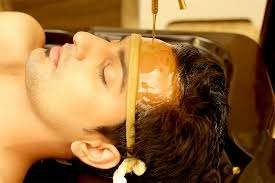Shirodhara

Introduction
In the realm of ancient healing practices, Ayurveda stands as a time-tested approach to achieving balance and harmony within the body and mind. One of the remarkable therapies within Ayurveda is Shirodhara, a treatment that goes beyond the physical to nurture the spirit. Let’s embark on a journey to explore the depths of Shirodhara and understand its profound impact on holistic wellness.
Origin and History of Shirodhara
Shirodhara’s roots trace back to the ancient texts of Ayurveda (Ashtang Hridaya), where sages and healers recognized the therapeutic potential of nurturing the head and mind. Over centuries, Shirodhara has evolved, incorporating wisdom from various Ayurvedic traditions to become the soothing therapy we know today.
Understanding Ayurvedic Principles
Ayurveda gives same importance to mental health as it gives to physical health. Central to Ayurveda, there are the three doshas—Vata, Pitta, and Kapha—representing different combinations of elements in the body. Each dosha has its unique characteristics that can impact mental attributes, emotions, and cognitive processes.
1. Vata Dosha: Vata is associated with the elements of air and space. When it dominates, it can lead to qualities such as lightness, mobility, and variability. In the mind, an excess of Vata may manifest as anxiety, restlessness, and scattered thoughts. It can also contribute to difficulty in focusing and insomnia.
2. Pitta Dosha: Pitta is linked to the elements of fire and water, representing qualities like heat, intensity, and transformation. In the mental realm, an aggravated Pitta can result in heightened emotions such as anger, irritability, and impatience. It may also contribute to critical thinking and perfectionism.
3. Kapha Dosha: Kapha embodies the elements of earth and water, imparting qualities of stability, heaviness, and cohesion. An excess of Kapha in the mind may lead to feelings of lethargy, complacency, and resistance to change. It can also contribute to a tendency towards attachment and possessiveness.
What is Shirodhara?
Shirodhara is a unique Ayurvedic therapy where a continuous stream of warm herbal oil, medicated milk, or other liquids is gently poured onto the forehead, specifically targeting the “third eye” or Ajna chakra. This rhythmic flow induces a state of deep relaxation, facilitating healing at both the physical and mental levels.
The Therapeutic Process
The procedure is designed to induce a state of deep relaxation and balance the doshas, particularly Vata dosha.
1. Preparation of Shirodhara:
- The individual undergoing Shirodhara lies down on a comfortable table, usually in a supine position. The therapist ensures a tranquil environment, minimizing external disturbances.
2. Selection of Oil:
- The choice of oil depends on the individual’s dosha constitution and specific health needs. Medicated oils, herbal-infused oils, or even decoctions like buttermilk are common choices.
3. Adjusting Temperature:
- The selected liquid is gently heated to a comfortable temperature. The warmth of the liquid plays a crucial role in promoting relaxation and balancing the doshas.
4. Positioning the Vessel:
- We have an automatic machine which helps to positioning Dhara over third eye.
5. Forehead Stimulation:
- Before starting the pouring, the therapist massages or stimulates the forehead and scalp to prepare the individual for the therapy.
6. Continuous Pouring:
- The therapist initiates a steady and rhythmic stream of the warm liquid onto the individual’s forehead, specifically targeting the “Ajna” or third eye region. The liquid flows gently in a side to side motion.
7. Duration of Shirodhara:
- The duration of Shirodhara may vary but typically lasts for about 30 to 60 minutes. During this session, a calm and low light area is must for better relaxation.
8. Post-Therapy Rest:
- After the pouring is complete, the individual is allowed to rest for a short period, absorbing the therapeutic effects of the treatment. Then we provide hair wash to remove all the oil from hair.
Types of Shirodhara
In Ayurveda, Shirodhara is a versatile therapy that comes in several types, each catering to specific health concerns and dosha imbalances. The different types of Shirodhara include:
- Taila Dhara: Taila Dhara involves pouring warm herbal oil onto the forehead in a rhythmic manner. This is the classical form of Shirodhara and is effective in calming the mind, reducing stress, and balancing the doshas.
- Ksheera Dhara: Instead of oil, medicated milk is used in Ksheera Dhara. This type of Shirodhara is beneficial for calming Pitta dosha, soothing inflammation, and promoting a cooling effect on the body and mind.
- Takra Dhara: In Takra Dhara, medicated buttermilk is poured over the forehead. It is particularly useful for balancing Kapha dosha, treating skin conditions, and improving digestion.
- Jal Dhara: Jal Dhara involves pouring a continuous stream of water over the forehead. This form of Shirodhara is cooling, refreshing, and helps balance excess heat in the body.
- Ghee Dhara: Ghee Dhara utilizes medicated ghee in the pouring process. This type of Shirodhara is believed to nourish the brain, improve mental clarity, and promote overall well-being.
- Kashaya Dhara: Kashaya Dhara involves the use of a medicated herbal decoction instead of oil. This form is particularly effective for alleviating pain, reducing inflammation, and addressing Vata-related disorders.
Conditions Treated with Shirodhara
Shirodhara, a prominent Ayurvedic therapy, is renowned for its efficacy in addressing various health conditions and promoting overall well-being. Some of the conditions treated with Shirodhara include:
- Stress and Anxiety: Shirodhara is highly effective in calming the mind, reducing stress, and alleviating symptoms of anxiety. The continuous flow of warm oil or other liquids induces a deep state of relaxation.
- Insomnia and Sleep Disorders: The soothing nature of Shirodhara helps regulate sleep patterns and is beneficial for individuals experiencing insomnia or other sleep disturbances.
- Headaches and Migraines: Shirodhara’s ability to calm the nervous system makes it a valuable therapy for those suffering from chronic headaches or migraines.
- Mental Fatigue: This Ayurvedic treatment is known to rejuvenate the mind, enhance mental clarity, and alleviate mental fatigue, making it beneficial for individuals experiencing cognitive strain.
- Hormonal Imbalances: Shirodhara is often recommended for balancing hormonal issues, particularly in women. It can be helpful in managing menstrual irregularities and addressing symptoms of menopause.
- Hypertension: The relaxation induced by Shirodhara contributes to lowering blood pressure, making it a supportive therapy for individuals dealing with hypertension.
- Neurological Disorders: Shirodhara may assist in managing certain neurological conditions, providing relief for conditions like Parkinson’s disease and other disorders affecting the nervous system.
- Chronic Fatigue Syndrome: Individuals experiencing chronic fatigue can benefit from the rejuvenating effects of Shirodhara, enhancing overall energy levels.
- Emotional Imbalances: Shirodhara plays a role in balancing emotions, making it a valuable therapy for those dealing with mood swings, depression, or other emotional challenges.
FAQs
Shirodhara is generally safe, but pregnant women and individuals with specific medical conditions should consult with a healthcare professional before undergoing the treatment.
The frequency of Shirodhara sessions varies based on individual needs and health goals. Consult with us to determine the optimal schedule.
Yes, Shirodhara complements various wellness practices, including yoga and meditation, enhancing the overall benefits.
While rare, some individuals may experience mild side effects. It’s essential to communicate any concerns with the Ayurvedic practitioner to ensure a safe experience.
Yes, a simplified version of Shirodhara can be practiced at home, but it’s advisable to seek guidance from an Ayurvedic expert for a personalized approach.
Uniqueness of our therapies
At Arogya Mandir – Shri Siddhanath Ayurvedic Hospital, Miraj, we delve deeply into the ayurvedic examination of each patient. Utilizing noninvasive Ayurvedic diagnostic tools such as Ashtavidha Parikshan and Nadi Parikshan, we precisely determine the pathogenesis of the disease and then prescribe therapies tailored to the specific condition. This approach leads to expedited results.
Our therapies boast the following distinctive features:
– Tranquil and hygienic therapy rooms staffed with trained therapists in a positive environment.
– Selection of appropriate massage oil based on the patient’s Prakruti and the condition of the disease.
– Complimentary Prakruti and Dhatu Sarata examinations before the commencement of therapies.
– Authenticated procedures for each therapy.
– Judicious use of herbal medicines and instruments during the therapy sessions.
– Specialized rooms equipped with all facilities for inpatient care.
Feel free to share this article at no cost.
Copyright message – Dr. Prashant Chivate has published this article on drchivateayurved.org for informational purposes about diseases. Any other use of this article is strictly prohibited. All rights reserved.
